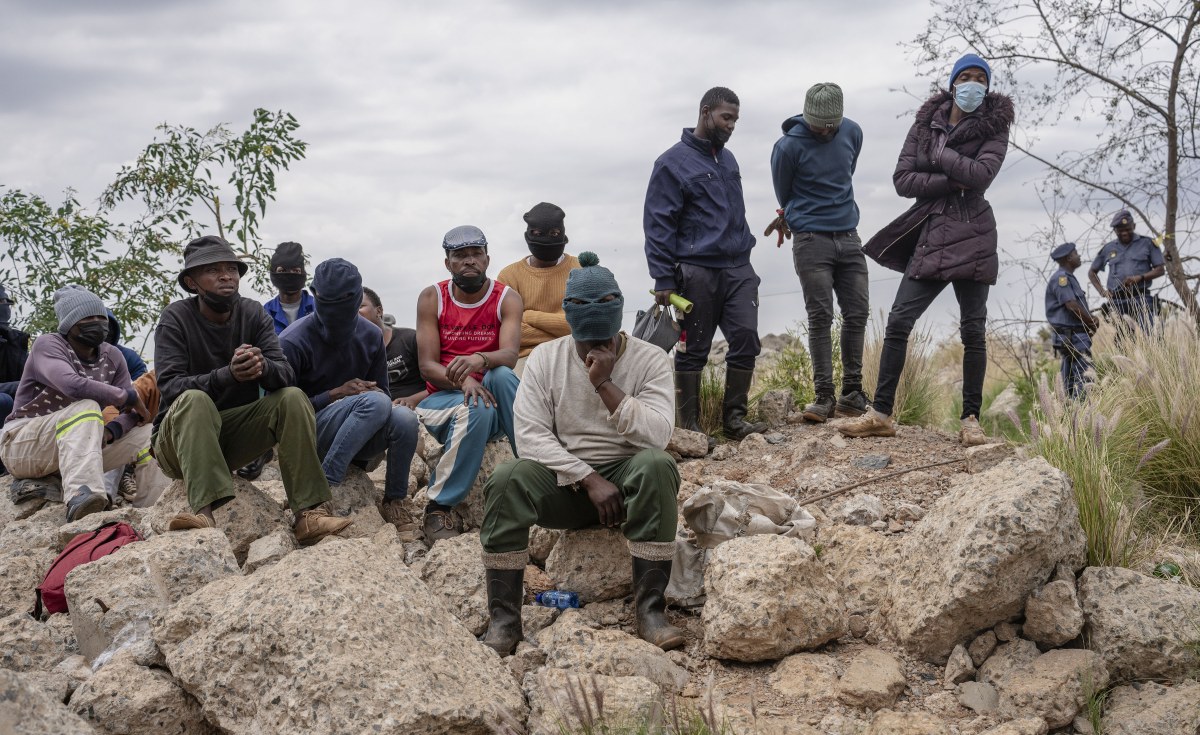Paris, France and Johannesburg — During the week of TotalEnergies’ Annual General Meeting (AGM) (to be held today 24 May 2024) and Africa Day, protesters in both South Africa and France continue voicing their collective opposition to the multinationals’ ongoing offshore oil and gas projects. The Green Connection (South Africa) and Bloom (France) – civil society organisations working with small-scale fishers and others to create widespread awareness of the harm caused by such projects – say these protests aim to reiterate the urgent need for a just energy transition, to move away from fossil fuels that exacerbate climate change.
Coinciding with TotalEnergies’ AGM in Paris, these protests aim to emphasize that while the company may be toasting 100 years of operation and profits, this centenary is no cause for celebration. Instead, it represents a century of the company’s contribution to climate change and environmental degradation, through its relentless oil and gas exploration and extraction. The protesters call attention to the 2023 Intergovernmental Panel on Climate Change (IPCC) report, which highlights the severe impacts of human activities on weather patterns and the environment, emphasizing that climate change particularly affects those least responsible for the crisis.
Global Call for Climate Justice
Currently in France, The Green Connection’s Strategic Lead Liziwe McDaid says, “TotalEnergies has been around for 100 years, and in our view, there is a climate crisis requiring immediate climate justice. Companies like TotalEnergies must be held accountable and cannot continue prioritising profits over people and the planet. This is why we are also driving our StopTEEPSA campaign in South Africa because now is the time for companies like TotalEnergies to move away from oil and gas, rather than continuing operations that could totally destroy our oceans.”
Claire Nouvian of Bloom echoed this sentiment, adding, “The past decisions of TotalEnergies’ board of directors and main shareholders have proven that those with financial interests in environmental destruction are not fit to make responsible decisions. We must stop climate criminals – it has become a question of life or death.”
The Green Connection’s Advocacy Officer Lisa Makaula says, “Today, we are outside TotalEnergies’ AGM. We came all the way from South Africa, Cape Town to raise concerns about TotalEnergies exploration projects in South Africa. To call on them to move away from fossil fuels, particularly oil and gas exploration, which could possibly threaten the environment and the coastal livelihoods that depend on the ocean. We are here with multiple organisations to support StopEACOP and to support the criminal challenge against TotalEnergies – launched by Bloom, Santé Planétaire, Nuestro Futuro and victims of climate change. TotalEnergies must shift their resources and revenue to renewable projects, now.”
Protests in South Africa
In South Africa, protests demonstrating widespread opposition of further oil and gas exploitation have erupted throughout May. In South Africa, small-scale fishers and activists are calling out both TotalEnergies and Shell, with Shell still trying to exploit the Wild Coast. The appeal of the historic judgment secured by the Wild Coast Communities took place last Friday 17 May). Coastal communities in multiple provinces have rallied against these companies, for their potential to harm the environment and the livelihoods of those who depend on it. This wave of activism highlights the need for the South African government to pivot towards renewable, sustainable, and affordable energy solutions.
The Green Connection’s Community Mobilisation Officer, Warren Blouw, stresses the economic stakes, he says, “TotalEnergies and other oil and gas companies must consider the livelihoods of small-scale fishers, whose economic wellbeing is jeopardised by offshore oil and gas exploration. We must unite to protect Africa and its resources from those who only seek profit, at the cost of regular South Africans.”
Zinhle Mthiyane of the South Durban Community Environmental Alliance emphasized the local impact. She says, “We are protesting to protect the environment and prevent ocean pollution. Drilling for oil and gas in South African waters could degrade the environment, threatening livelihoods, and cultural practices.”
Voices from the Frontlines
Community members and activists have travelled to France to show their support for Bloom’s criminal complaint against TotalEnergies. Sifiso Ntsunguzi, a small-scale fisher from Port St John’s in the Eastern Cape, and Darlin McQuin, an activist from a fisher family in Doringbaai on the West Coast, are among those calling for a halt to fossil fuel expansion.
McQuin says, “Many of our people’s livelihood come from the sea. The sea is what we know. I am in France to voice out the concerns of the small-scale fishers in my community, to advocate to stop TotalEnergies. We do not want oil and gas exploration in South Africa. We don’t want TotalEnergies in South Africa.”
Ntsunguzi says, “We are in Paris to support the court case against TotalEnergies oil and gas projects. As a small-scale fisher and member of a coastal community, I do not support the exploration of oil and gas in the ocean. We use the ocean for cultural practices and a means to sustain our livelihood. We are against exploration of gas and oil, as it may risk degradation of environment and marine ecosystems, our livelihood and our health. I come from a fishing community and have become a fisher myself.”
Political Implications
With South Africa’s national elections just a week away, these protests also serve as a clarion call to voters. Electing leaders committed to environmental protection is crucial for ensuring the wellbeing of present and future generations. The Green Connection’s Community Outreach Coordinator Neville van Rooy says, “We do not agree that a French oil company should plunder our ocean, threatening the livelihoods of small-scale fishers. Our government must take its commitment to the Paris Agreement seriously.”










